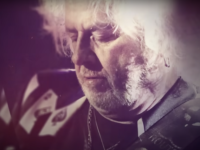Toto’s Fahrenheit, released in August 1986, fell into an emerging trend — even as it marked the debut of frontman Joseph Williams. An album of varied musical goals and textures was reduced to its singles, both of them Top 40 ballads.
For instance, “Can’t Stand It Any Longer” — co-written by Steve Lukather, David Paich and Joseph Williams — found a tough rock groove on Fahrenheit, and it proved to be a worthy showcase for Joseph Williams’ grittier style. The title track also had a crisp, funky groove. But neither became singles. Instead, “I’ll Be Over You” streaked to No. 11 and “Without Your Love” went to No. 38.
“The pop hits, if you listen to the whole album, they would take a single off of it — and it would be the ballad, or a softer song,” Steve Lukather tells us. “But there was always rock stuff on all of the albums. If you come see us live, people will say: These guys are a lot tougher live than we would have imagined. That’s just the way we play. We’re not trying to prove anything. We’ll morph from style to style. That was the thing that was confusing about us, and it maybe pissed off the critics. But it gained us a lot of other people who actually buy records.”
Elsewhere, Toto’s Fahrenheit is highlighted by “We Can Make It Tonight,” an upbeat pop gem; the more muscular “Till the End”; the jazzy “Somewhere Tonight”; and “Lea,” a diaphanous love song from Steve Porcaro. But all you’ll ever hear on the radio, for better or for worse, is “I’ll Be Over You.”
Fahrenheit‘s big hit did mark another success for the songwriting team of Steve Lukather and Randy Goodrum. He’s contributed to hits from a number of country artists — not to mention Chicago (“If She Would Have Been Faithful”), Journey’s Steve Perry (“Oh Sherrie,” “Foolish Heart”) and a host of others. Goodman has since worked on many of Lukather’s solo albums, beginning with his 1989 self-titled release.
“As a producer, he gets good vocals out of you,” Steve Lukather adds. “He has a very unique style, something that really brings the best out of you. We’ve had a long, long relationship. He’s really good at what he does. That sounds like a throwaway line, but he’s a brilliant musician. Randy’s sense and knowledge of music, of not doing the cliché thing, is there. When you co-write with people, there is a certain chemistry that has to be there. We finish things; that’s the key. A lot of people write a lot of stuff, but do you finish it? It’s great to have that kind of person.”
A deeper dive into the complex and still entertaining Fahrenheit even finds an album-closing collaboration between Lukather, David Paich and jazzman Miles Davis. That might have seemed like an odd-ball choice, if not for the guitarist’s history with one of jazz music’s most mercurial figures.
In fact, “Don’t Stop Me Now” brought Steve Lukather full circle. After all, he had been offered a spot in Davis’ band just as Toto was preparing for one of its earliest tours. But Lukather, who had grown up with most of the members of Toto, simply couldn’t — wouldn’t — leave people he loved then, as now, like brothers.
“He asked me,” Lukather tells us, “and I said I couldn’t. We were just getting started. I told him, ‘I don’t even know if I am good enough to be in your band.’ (Lukather begins to impersonate Miles Davis, switching to a gravelly whisper.) He says ‘I like that rock ’n’ roll shit.’ I was so honored, but I couldn’t do that to my guys.”
- Nick DeRiso’s Best of 2015 (Rock + Pop): Death Cab for Cutie, Joe Jackson, Toto + Others - January 18, 2016
- Nick DeRiso’s Best of 2015 (Blues, Jazz + R&B): Boz Scaggs, Gavin Harrison, Alabama Shakes - January 10, 2016
- Nick DeRiso’s Best of 2015 (Reissues + Live): John Oates, Led Zeppelin, Yes, Faces + others - January 7, 2016



